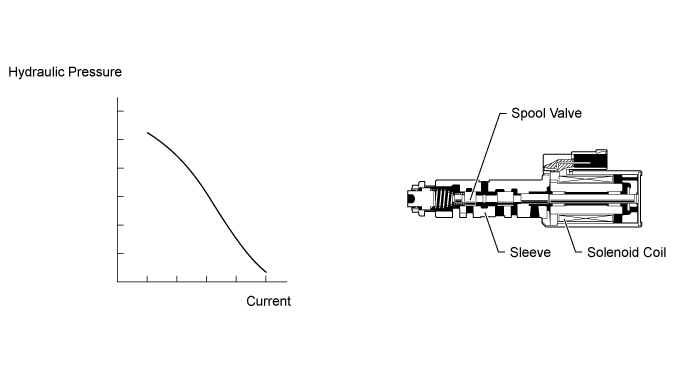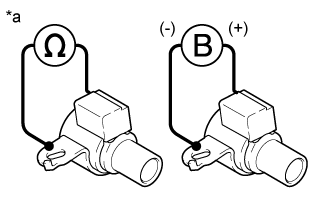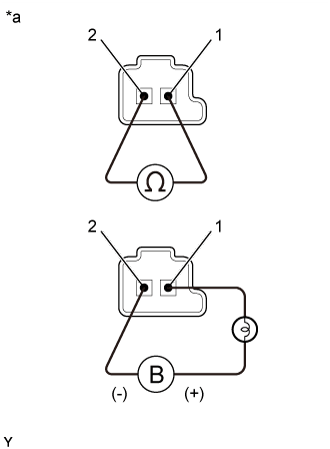Drivetrain. Land Cruiser. Urj200, 202 Grj200 Vdj200
DESCRIPTION
MONITOR DESCRIPTION
INSPECTION PROCEDURE
CHECK DTC OUTPUT (IN ADDITION TO DTCS P0894 AND P2714)
PERFORM ACTIVE TEST USING GTS (SHIFT SOLENOID VALVE SLT)
PERFORM ACTIVE TEST USING GTS (RUNNING TEST)
INSPECT SHIFT SOLENOID VALVE S1
INSPECT TRANSMISSION VALVE BODY ASSEMBLY
INSPECT TORQUE CONVERTER ASSEMBLY
INSPECT SHIFT SOLENOID VALVE S2
INSPECT TRANSMISSION VALVE BODY ASSEMBLY
INSPECT TORQUE CONVERTER ASSEMBLY
INSPECT SHIFT SOLENOID VALVE S3
INSPECT TRANSMISSION VALVE BODY ASSEMBLY
INSPECT TORQUE CONVERTER ASSEMBLY
INSPECT SHIFT SOLENOID VALVE S4
INSPECT SHIFT SOLENOID VALVE SL2
INSPECT TRANSMISSION VALVE BODY ASSEMBLY
INSPECT TORQUE CONVERTER ASSEMBLY
INSPECT SHIFT SOLENOID VALVE SLT
INSPECT TRANSMISSION VALVE BODY ASSEMBLY
INSPECT TORQUE CONVERTER ASSEMBLY
DTC P0894 Transmission Component Slipping |
DTC P2714 Pressure Control Solenoid "D" Performance (Shift Solenoid Valve SLT) |
DESCRIPTION
The shift solenoid valve SLT controls the transmission line pressure for smooth transmission operation based on signals from the throttle position sensor and the vehicle speed sensor. The ECM adjusts the current of the SLT solenoid valve to control the hydraulic line pressure coming from the primary regulator valve. Appropriate line pressure assures smooth shifting with varying engine outputs.DTC Code
| DTC Detection Condition
| Trouble Area
|
P0894
| The ECM detects a malfunction of the SLT, S1, S2, S3, S4, SL2, gear 6 incorrect ratio (sequence valve) or 1-2 shift solenoid valves according to the revolution difference of the turbine and output shaft, and also by the oil pressure (2 trip detection logic).
| - Shift solenoid valve SLT remains open or closed
- Shift solenoid valve S1, S2, S3, S4 or SL2 remains open or closed
- Gear 6 incorrect ratio (sequence valve) or 1-2 shift valve is stuck
- Valve body is blocked
- Automatic transmission (clutch, brake, gear, etc.)
|
P2714
| The ECM detects a malfunction of the SLT shift solenoid valve (ON side) according to the revolution difference of the turbine and output shaft, and also by the oil pressure (2 trip detection logic).
| - Shift solenoid valve SLT remains open or closed
- Shift solenoid valve S1, S2, S3, S4 or SL2 remains open or closed
- Gear 6 incorrect ratio (sequence valve) or 1-2 shift valve is stuck
- Valve body is blocked
- Automatic transmission (clutch, brake, gear, etc.)
|
MONITOR DESCRIPTION
The ECM calculates the amount of heat absorbed by the friction material based on the difference in revolution (clutch slippage) between the turbine and output shaft. The ECM illuminates the MIL and stores this DTC when the amount of heat absorption exceeds the specified value.There are two reasons that make the revolution different.- When the shift solenoid valve SLT remains on, oil pressure goes down and clutch engagement force decreases.
- When the shift solenoid valve remains on or off, the gear position commanded by the ECM and the actual gear position are not the same.
- NOTICE:
- If you continue driving under these conditions, the clutch will burn out and the vehicle will no longer be drivable.
INSPECTION PROCEDURE
| 1.CHECK DTC OUTPUT (IN ADDITION TO DTCS P0894 AND P2714) |
Connect the GTS to the DLC3.
Turn the engine switch on (IG).
Turn the GTS on.
Enter the following menus: Powertrain / Engine and ECT / Trouble Codes.
Read the DTCs using the GTS.
ResultResult
| Proceed to
|
P0894 and/or P2714 is output
| A
|
P0894, P2714 and other DTCs are output
| B
|
- HINT:
- If any other codes besides P0894 and P2714 are output, perform troubleshooting for those DTCs first.
| 2.PERFORM ACTIVE TEST USING GTS (SHIFT SOLENOID VALVE SLT) |
- NOTICE:
- Perform the test at the normal operating ATF temperature: 50 to 80°C (122 to 176°F).
- Be careful to prevent SST hose from interfering with the exhaust pipe.
- Perform the test with the A/C turned off.
- HINT:
- Using the GTS to perform Active Tests allows relays, VSVs, actuators and other items to be operated without removing any parts. This non-intrusive functional inspection can be very useful because intermittent operation may be discovered before parts or wiring is disturbed. Performing Active Tests early in troubleshooting is one way to save diagnostic time. Data List information can be displayed while performing Active Tests.
Remove the test plug on the transmission case center right side and connect SST.
- SST
- 09992-00095(09992-00231,09992-00271)
Connect the GTS to the DLC3.
Start the engine and warm it up.
Measure the line pressure with SST.
Turn the GTS on.
Enter the following menus: Powertrain / Engine and ECT / Active Test.
According to the display on the GTS, perform the Active Test.
Measure the line pressure.
Engine and ECTTester Display
| Test Part
| Control Range
| Diagnostic Note
|
Activate the Solenoid (SLT)*
| Operate shift solenoid valve SLT and raise line pressure
| ON or OFF
- HINT:
- OFF: Line pressure up (when Active Test "Activate the Solenoid (SLT)" is performed, ECM commands shift solenoid valve SLT to turn OFF)
- ON: No action (normal operation)
| [Vehicle Condition]
- The vehicle is stopped.
- The engine is idling.
|
- HINT:
- *: Activate the Solenoid (SLT) in the Active Test is performed to check the line pressure changes by connecting SST to the automatic transmission, which is used in the Hydraulic Test (Click here) as well. Note that the pressure values in the Active Test and hydraulic test are different.
- OK:
- The line pressure changes as specified when performing the Active Test.
| 3.PERFORM ACTIVE TEST USING GTS (RUNNING TEST) |
- CAUTION:
- This test should always be performed with at least 2 people.
- NOTICE:
- Perform the test at the normal operating ATF temperature: 50 to 80°C (122 to 176°F).
- Perform the test with the A/C turned off.
- HINT:
- Using the GTS to perform Active Tests allows relays, VSVs, actuators and other items to be operated without removing any parts. This non-intrusive functional inspection can be very useful because intermittent operation may be discovered before parts or wiring is disturbed. Performing Active Tests early in troubleshooting is one way to save diagnostic time. Data List information can be displayed while performing Active Tests.
Connect the GTS to the DLC3.
Clear the DTC (Click here).
Warm up the engine.
Enter the following menus: Powertrain / Engine and ECT / Active Test.
According to the display on the GTS, perform the Active Test.
- HINT:
- While driving, the shift position can be forcibly changed with the GTS.
Engine and ECTTester Display
| Test Part
| Control Range
| Diagnostic Note
|
Control the Shift Position
| Operate shift solenoid valve and set each shift position
| - Press "→" button: Shift up
- Press "←" button: Shift down
| It is possible to check the operation of the shift solenoid valves.
[Vehicle Condition]
The vehicle speed is 50 km/h (31 mph) or less.
|
- HINT:
- This test can be conducted when the vehicle speed is 50 km/h (31 mph) or less.
- The 4th to 5th and 5th to 6th up-shifts must be performed with the accelerator pedal released.
- The 6th to 5th and 5th to 4th down-shifts must be performed with the accelerator pedal released.
- Do not operate the accelerator pedal for at least 2 seconds after shifting and do not shift successively.
- The shift position commanded by the ECM is shown in the Data List display on the GTS.
Compare the ECM gear shift command and the actual gear position.
- OK:
- Gear position changes in accordance with the GTS command.
ResultSystem Condition
| ECM Gear Shift Command
| Proceed to
|
1st
| 2nd
| 3rd
| 4th
| 5th
| 6th
|
Malfunction
| Shift solenoid valve S1
| Stuck ON*1
| 2nd
| 2nd
| 3rd
| 4th
| 5th
| 6th
| A
|
Stuck OFF
| 1st
| 1st
| 3rd
| 4th
| 5th
| N*2
|
Shift solenoid valve S2
| Stuck ON
| 1st
| 2nd
| 2nd
| 4th
| 6th
| 6th
| B
|
Stuck OFF
| 3rd
| 3rd
| 3rd
| 4th
| 5th
| 5th
|
Shift solenoid valve S3
| Stuck ON
| 1st
| 2nd
| 3rd
| 3rd
| N*2
| N*2
| C
|
Stuck OFF
| 3rd
| 4th
| 4th
| 4th
| 5th
| 6th
|
Shift solenoid valve S4
| Stuck ON*3
| 1st
| 2nd
| 3rd
| 4th
| 5th
| 6th
| D
|
Stuck OFF
| 1st
| 2nd
| 3rd
| 4th
| 4th
| 4th
|
Normal
| 1st
| 2nd
| 3rd
| 4th
| 5th
| 6th
| E
|
- HINT:
- *1: When shift solenoid valve S1 is stuck ON, the vehicle cannot drive in reverse.
- *2: Neutral
- *3: When shift solenoid valve S4 is stuck ON, gear shifting is normal.
| 4.INSPECT SHIFT SOLENOID VALVE S1 |
Remove the shift solenoid valve S1.
Measure the resistance according to the value(s) in the table below.
- Standard Resistance:
Tester Connection
| Condition
| Specified Condition
|
Shift solenoid valve S1 connector terminal - Shift solenoid valve S1 body
| 20°C (68°F)
| 11 to 15 Ω
|
Apply 12 V battery voltage to the shift solenoid valve and check that the valve moves and makes an operating noise.
- OK:
Measurement Condition
| Specified Condition
|
- Battery positive (+) → Shift solenoid valve S1 connector
- Battery negative (-) → Shift solenoid valve S1 body
| Valve moves and makes an operating noise
|
Text in Illustration*a
| Component without harness connected
(Shift Solenoid Valve S1)
|
| 5.INSPECT TRANSMISSION VALVE BODY ASSEMBLY |
Check the transmission valve body assembly (Click here).
- OK:
- There are no foreign objects on any valve.
| | REPAIR OR REPLACE TRANSMISSION VALVE BODY ASSEMBLY (Click here) |
|
|
| 6.INSPECT TORQUE CONVERTER ASSEMBLY |
Check the torque converter assembly (Click here).
- OK:
- The torque converter assembly operates normally.
| OK |
|
|
|
| REPAIR OR REPLACE AUTOMATIC TRANSMISSION ASSEMBLY (Click here) |
|
| 7.INSPECT SHIFT SOLENOID VALVE S2 |
Remove the shift solenoid valve S2.
Measure the resistance according to the value(s) in the table below.
- Standard Resistance:
Tester Connection
| Condition
| Specified Condition
|
Shift solenoid valve S2 connector terminal - Shift solenoid valve S2 body
| 20°C (68°F)
| 11 to 15 Ω
|
Apply 12 V battery voltage to the shift solenoid valve and check that the valve moves and makes an operating noise.
- OK:
Measurement Condition
| Specified Condition
|
- Battery positive (+) → Shift solenoid valve S2 connector
- Battery negative (-) → Shift solenoid valve S2 body
| Valve moves and makes an operating noise
|
Text in Illustration*a
| Component without harness connected
(Shift Solenoid Valve S2)
|
| 8.INSPECT TRANSMISSION VALVE BODY ASSEMBLY |
Check the transmission valve body assembly (Click here).
- OK:
- There are no foreign objects on any valve.
| | REPAIR OR REPLACE TRANSMISSION VALVE BODY ASSEMBLY (Click here) |
|
|
| 9.INSPECT TORQUE CONVERTER ASSEMBLY |
Check the torque converter assembly (Click here).
- OK:
- The torque converter assembly operates normally.
| OK |
|
|
|
| REPAIR OR REPLACE AUTOMATIC TRANSMISSION ASSEMBLY (Click here) |
|
| 10.INSPECT SHIFT SOLENOID VALVE S3 |
Remove the shift solenoid valve S3.
Measure the resistance according to the value(s) in the table below.
- Standard Resistance:
Tester Connection
| Condition
| Specified Condition
|
Shift solenoid valve S3 connector terminal - Shift solenoid valve S3 body
| 20°C (68°F)
| 11 to 15 Ω
|
Apply 12 V battery voltage to the shift solenoid valve and check that the valve moves and makes an operating noise.
- OK:
Measurement Condition
| Specified Condition
|
- Battery positive (+) → Shift solenoid valve S3 connector
- Battery negative (-) → Shift solenoid valve S3 body
| Valve moves and makes an operating noise
|
Text in Illustration*a
| Component without harness connected
(Shift Solenoid Valve S3)
|
| 11.INSPECT TRANSMISSION VALVE BODY ASSEMBLY |
Check the transmission valve body assembly (Click here).
- OK:
- There are no foreign objects on any valve.
| | REPAIR OR REPLACE TRANSMISSION VALVE BODY ASSEMBLY (Click here) |
|
|
| 12.INSPECT TORQUE CONVERTER ASSEMBLY |
Check the torque converter assembly (Click here).
- OK:
- The torque converter assembly operates normally.
| OK |
|
|
|
| REPAIR OR REPLACE AUTOMATIC TRANSMISSION ASSEMBLY (Click here) |
|
| 13.INSPECT SHIFT SOLENOID VALVE S4 |
Remove the shift solenoid valve S4.
Measure the resistance according to the value(s) in the table below.
- Standard Resistance:
Tester Connection
| Condition
| Specified Condition
|
Shift solenoid valve S4 connector terminal - Shift solenoid valve S4 body
| 20°C (68°F)
| 11 to 15 Ω
|
Apply 12 V battery voltage to the shift solenoid valve and check that the valve moves and makes an operating noise.
- OK:
Measurement Condition
| Specified Condition
|
- Battery positive (+) → Shift solenoid valve S4 connector
- Battery negative (-) → Shift solenoid valve S4 body
| Valve moves and makes an operating noise
|
Text in Illustration*a
| Component without harness connected
(Shift Solenoid Valve S4)
|
| 14.INSPECT SHIFT SOLENOID VALVE SL2 |
Remove the shift solenoid valve SL2.
Measure the resistance according to the value(s) in the table below.
- Standard Resistance:
Tester Connection
| Condition
| Specified Condition
|
1 - 2
| 20°C (68°F)
| 5.0 to 5.6 Ω
|
Apply 12 V battery voltage to the shift solenoid valve and check that the valve moves and makes an operating noise.
- OK:
Measurement Condition
| Specified Condition
|
- Battery positive (+) with a 21 W bulb → Terminal 1
- Battery negative (-) → Terminal 2
| Valve moves and makes an operating noise
|
Text in Illustration*a
| Component without harness connected
(Shift Solenoid Valve SL2)
|
| 15.INSPECT TRANSMISSION VALVE BODY ASSEMBLY |
Check the transmission valve body assembly (Click here).
- OK:
- There are no foreign objects on any valve.
| | REPAIR OR REPLACE TRANSMISSION VALVE BODY ASSEMBLY (Click here) |
|
|
| 16.INSPECT TORQUE CONVERTER ASSEMBLY |
Check the torque converter assembly (Click here).
- OK:
- The torque converter assembly operates normally.
| OK |
|
|
|
| REPAIR OR REPLACE AUTOMATIC TRANSMISSION ASSEMBLY (Click here) |
|
| 17.INSPECT SHIFT SOLENOID VALVE SLT |
Remove the shift solenoid valve SLT.
Measure the resistance according to the value(s) in the table below.
- Standard Resistance:
Tester Connection
| Condition
| Specified Condition
|
1 - 2
| 20°C (68°F)
| 5.0 to 5.6 Ω
|
Apply 12 V battery voltage to the shift solenoid valve and check that the valve moves and makes an operating noise.
- OK:
Measurement Condition
| Specified Condition
|
- Battery positive (+) with a 21 W bulb → Terminal 2
- Battery negative (-) → Terminal 1
| Valve moves and makes an operating noise
|
Text in Illustration*a
| Component without harness connected
(Shift Solenoid Valve SLT)
|
| 18.INSPECT TRANSMISSION VALVE BODY ASSEMBLY |
Check the transmission valve body assembly (Click here).
- OK:
- There are no foreign objects on any valve.
| | REPAIR OR REPLACE TRANSMISSION VALVE BODY ASSEMBLY (Click here) |
|
|
| 19.INSPECT TORQUE CONVERTER ASSEMBLY |
Check the torque converter assembly (Click here).
- OK:
- The torque converter assembly operates normally.
| OK |
|
|
|
| REPAIR OR REPLACE AUTOMATIC TRANSMISSION ASSEMBLY (Click here) |
|







